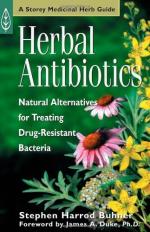|
This section contains 617 words (approx. 3 pages at 300 words per page) |

|
Antibiotic drugs (frequently referred to as antibiotics) are substances, usually obtained from microorganisms, that inhibit the growth of or destroy other microorganisms, particularly bacteria. Synthetic antibiotics also exist but the majority are analogs of naturally occurring antibiotics or their derivatives.
Antibiotics were first discovered in the nineteenth century when French chemist and bacteriologist Louis Pasteur demonstrated that one species of microorganism is capable of killing another. This idea was further developed by German bacteriologist Paul Ehrlich, who realized that selective toxicity was possible. Selective toxicity implies that a chemical can be toxic to one set of organisms, but leave others entirely unaffected. Many antibiotics come from bacteria, actinomycetes, and fungi. The most widely known antibiotic is penicillin, and its derivatives. Penicillin is produced by the mold Penicillium chrysogenum and the fact that it produces a substance capable of killing bacterial cultures was first noted by Scottish...
|
This section contains 617 words (approx. 3 pages at 300 words per page) |

|


